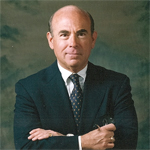A: We are losing the human aspects of medicine. We spend too much time in front of a computer instead of with our patients. That’s not specific to rheumatology, of course.
ACR Paulding Phelps Award
 Stuart Kassan, MD, MACR, Distinguished Clinical Professor of Medicine, University of Colorado, Denver School of Medicine; practicing rheumatologist, Colorado Arthritis Associates; CMO, Infusion Center of Denver and MPP Infusion Partners
Stuart Kassan, MD, MACR, Distinguished Clinical Professor of Medicine, University of Colorado, Denver School of Medicine; practicing rheumatologist, Colorado Arthritis Associates; CMO, Infusion Center of Denver and MPP Infusion Partners
Background: Dr. Kassan started his medical career as a young boy, joining his father on house calls. His dad loved being a physician “more than anything,” a feeling that was mutual between father and son. “Anyone who loves something that much, it must be very special,” Dr. Kassan says. “For me, it’s been very special, as well.”
In 1978, while working at the National Institutes of Health, he published a sentinel paper on the association of Sjögren’s syndrome with lymphoma. “That was extremely pivotal, in terms of forming my career,” he says. He since has testified before Congress on the subject and authored more than 40 articles, chapters and books about Sjögren’s syndrome, SLE and related diseases.
A longtime member and volunteer of the ACR, he served as a board member of the Rheumatology Research Foundation and was named Master of the ACR in 2012.
‘We can give our patients more hope than we’ve ever been able to give them before, and we are now able to prevent deformities that used to develop before the advent of biologics.’ —Dr. Kassan
Q: What about rheumatology keeps you engaged in your work?
A: The patients. I think being a physician and a rheumatologist is a very sacred thing. People tell me things that they tell nobody else. You become a part of their life. That is extremely important.
Q: What’s the biggest advance you’ve seen in rheumatology in your career?
A: We can give our patients more hope than we’ve ever been able to give them before, and we are now able to prevent deformities that used to develop before the advent of biologics. That’s been amazing.
Q: What does an award from your peers mean to you?
A: That’s probably the most gratifying part of this award. It reflects the fact that your peers respect you, and you’ve done a good job in their eyes.
Q: What has the ACR meant to you and your career?
A: I think the ACR is an organization that has allowed rheumatology to flourish. I’ve also been very active in the Rheumatology Research Foundation. That has really set the tone for future rheumatologists to be interested in the practice of rheumatology and be funded for future research.



